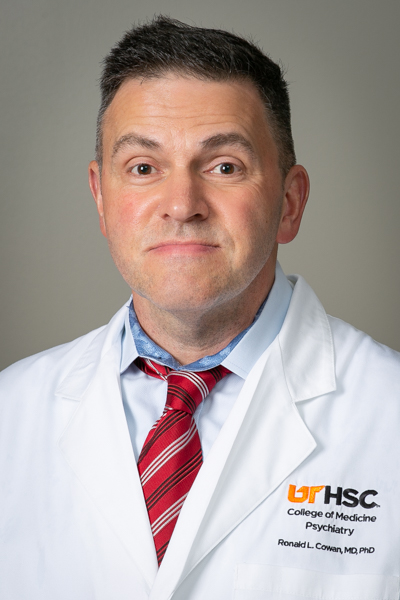Department of Psychiatry
For Patients — Find mental health treatment at UTHSC Psychiatry
University Clinical Health Adult Psychiatry Clinic: 901.448.2400LeBonheur Child and Adolescent Psychiatry Clinic: 866.870.5570
UTHSC Child Psychiatry Psychotherapy Clinic: 901.448.5944
Welcome to the UTHSC Department of Psychiatry

Ronald L. Cowan, MD, PhD
We live in an exciting time for psychiatry, as mental health is increasingly recognized as an important foundation for quality of life, physical health, and longevity. Psychiatrists are in high demand, and it's essential to increase the number of psychiatrists trained in order to meet the current and projected demand for mental health care.
UTHSC's Department of Psychiatry is well-positioned to meet present challenges and address future trends in psychiatric training, research, and clinical care. Through integrated, collaborative, and inclusive training, research, clinical care, and public service, the Department seek to improve the mental health and well-being of Tennesseans and the global community. We emphasize compassion and empathy in all of our endeavors and have a very patient-centered approach to treatment.
The Department has a long history of excellence in patient care, education, clinical training, and research in mood disorders. In the Department of Psychiatry, our faculty and trainees provide clinical care in a wide variety of settings, including emergency departments, inpatient psychiatry, general hospitals, outpatient departments, schools, and residential settings. We are also expanding our public service mission to include care delivery to underserved populations.
UTHSC’s Memphis campus has research, educational, and clinical partnerships with St. Jude Children’s Research Hospital, Methodist Healthcare, Regional One Health, Le Bonheur Children’s Hospital, Baptist Memorial Health Care, the Memphis Veterans Administration Medical Center, and St. Francis Hospital. Additional training sites for psychiatry include the Memphis Mental Health Institute and Lakeside Behavioral Health System. The medical campus is a vibrant and thriving training center, with over 600 medical students, 1,100 residents and fellows in the College of Medicine, and many more trainees in the Colleges of Dentistry, Graduate Health Sciences, Health Professions, Nursing, and Pharmacy.
The future of psychiatry looks bright, with psychiatrists playing an increasingly essential role in the health and welfare of the nation and the world. As we embrace our mission and advance the care of our patients, we hope that you will be inspired to learn more about psychiatry, our department, UTHSC, and Memphis.
Ronald L. Cowan, MD, PhD
Harrison Distinguished Professor and Chair
I am Dr. Altha Stewart, Senior Associate Dean for Community Health and Engagement
and Director of the Center for Youth Advocacy and Well-being [previously called the
Center for Health and Justice Involved Youth], as well as the Division of Public Community
Psychiatry here at the University of Tennessee Health Science Center in Memphis.
It’s my pleasure to introduce you to the wonderful world of the Department of Psychiatry here at UT. Here we do the psychiatric training for our residents, clinical care, medication management, and we’ve added some community mental health service programs so that you can also be well trained in working with the community.
We do some work in the research of addiction and depression, and we work very hard with state and federal partners through grants to work with our community around adverse childhood experiences and providing trauma informed care.
Finally, when it comes to working in this community, we have opportunities for you that can only be imagined if you come here and work with us. Please take a moment, look around, and see what we offer in our Psychiatric residency program, and if you’re so inclined, come here and have a visit. Take moment, take a look around, and come visit us soon. Thank you!
Altha J. Stewart, MD, Senior Associate Dean for Community Health Engagement


